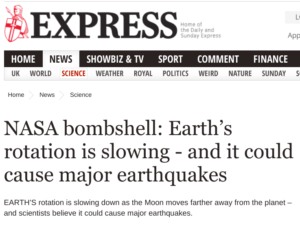A new 2019 study is claiming this: NASA bombshell: Earth’s rotation is slowing – and it could cause major earthquakes – EARTH’S rotation is slowing down as the Moon moves farther away from the planet – and scientists believe it could cause major earthquakes.
Excerpt: Earth’s rotation is slowing as our planet uses energy to keep the tidal bulge ahead of the Moon’s orbit. The Moon’s gravity keeps Earth’s rotation in check, and to do this the lunar satellite’s orbit must be slightly ahead of Earth’s. As the Moon attempts to regulate Earth’s rotation and slow it down, the Moon moves slowly away. According to Matthew Funke, solar system ambassador for NASA’s Jet Propulsion Laboratory, who wrote on Q+A website Quora: “The Moon’s gravity creates a tidal bulge on the Earth. This bulge attempts to rotate at the same speed as the rest of the planet.
But scientists and studies can’t seem to decide whether the Earth’s rotation is speeding up or slowing down and they are blaming “global warming” for both. See:
Flashback 2007: ‘Global warming’ will ‘reduce the length of a day’ – ‘Make Earth spin faster’
https://www.newscientist.com/article/dn11555-global-warming-will-make-earth-spin-faster/
Global warming will make Earth spin faster. Of all the possible ways in which climate change could affect our planet, this is the most bizarre: as the oceans warm up, Earth will start rotating a wee bit faster, reducing the length of a day. The time it takes for Earth to complete one rotation is affected by anything that changes the distribution of the planet’s mass relative to its axis of rotation. “Think of an ice skater who is spinning,” says Felix Landerer of the Max Planck Institute for Meteorology in Hamburg, Germany. “When you stretch your arms out you slow down, and when you bring your arms closer to your body you spin faster.” Earth, it seems, will hug itself a little bit tighter because of global warming. Landerer and his colleagues modelled the changes that would occur if the most realistic estimates made by the Intergovernmental Panel on Climate Change – a doubling of carbon dioxide levels by 2100 compared with 2000 – were to become reality. The team found that as the temperature of the oceans rises, the resulting changes in density and circulation would cause a net transfer of mass to the higher latitudes, closer to Earth’s axis of rotation. Consequently, Earth’s rotation would speed up, and by 2200 the length of a day would be reduced by 0.12 milliseconds (Geophysical Research Letters, vol 34, p L06307). While “it is not something you will see on your watch,” says Landerer, it’s comparable to the influence of the tidal friction of the Earth-moon system, which slows our planet down by 2.3 milliseconds every 100 years.
http://www.theguardian.com/science/2015/dec/11/climate-change-longer-days-glaciers-north-south-pole
Harvard University researchers have provided an answer to a long-held conundrum over how shrinking glaciers are affecting the rotation and axis of the Earth, calculating that the duration of a day has lengthened by a millisecond over the past 100 years. UN on wrong track with plans to limit global warming to 2C, says top scientist. The brakes will be more sharply applied to the Earth’s rotation as glaciers melt at an ever-faster rate, meaning that at least five milliseconds will be added to each day over the course of the 21st century. The axis of the Earth will shift too, with the north pole set to move position by about 1cm (o.4in) during this century. The research, published in Science Advances, apparently solved a scientific puzzle known as “Munk’s enigma”, which came from a 2002 researcher paper by oceanographer Walter Munk, examining how the melting of glaciers had altered the Earth’s rotation and axis.





